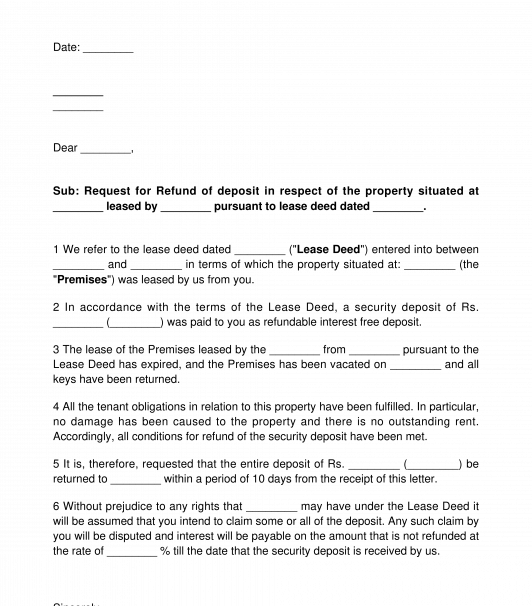 27-11-2025
27-11-2025

Answer a few questions and your document is created automatically.

Your document is ready! You will receive it in Word and PDF formats. You will be able to modify it.

 27-11-2025
27-11-2025
 Word and PDF
Word and PDF
 1 page
1 page
This Letter to Request Return of Security Deposit can be used by a tenant to request the return of a security deposit from a landlord, at the end of a residential tenancy. The letter provides a simple template, enabling the tenant to request that the deposit be paid.
Most landlords require that a security deposit be provided at the time of signing of a lease agreement. The security deposit is a refundable free deposit (ordinarily interest-free) which is to be returned at the end of the lease term or termination of tenancy. However, the refund is subject to the tenant returning the leased property in the same condition (normal wear and tear excepted). It is important that the lease agreement should contain clear provisions regarding the security deposit and under what circumstances amounts can be deducted from the security deposit prior to its refund to avoid disputes.
How to use this document?
Once the letter has been completed, it can be posted, emailed, or hand-delivered to the landlord.
The security deposit is not usually returned until after the tenant has vacated the property, so the letter is designed to be provided to the landlord after the tenant has already vacated the property.
The letter should be sent as soon as possible once this has occurred and should be sent before the tenant commences any legal proceedings seeking a return of the deposit.
Applicable Law
Lease deeds in India may be subject to the rent control laws of individual states, such as the Maharashtra Rent Control Act, 1999, subject however to the exceptions therein. Rent Control Acts provide some rights and benefits to tenants, such as protection against eviction, limits on the rent being charged etc.
Where a property falls under the rent control law, the tenant may become a statutory tenant. However, usually the provisions of the rent control acts apply to where a premise is given on rent for a continuous period of 1 year or more. Due to this reason, often landlords prefer to enter into lease agreements for a period of 11 months, which provides flexibility in terms of setting the rent and security deposit as per market rates. There are no clear legal provisions on the amount of security deposit to be charged. However, there have been some court verdicts wherein courts have limited the amount of security deposit that can be taken by landlords.
In the event the landlord fails to refund the deposit, legal action can be initiated for recovery of the same by sending a legal notice if the matter cannot be solved amicably.
How to modify the template?
You fill out a form. The document is created before your eyes as you respond to the questions.
At the end, you receive it in Word and PDF formats. You can modify it and reuse it.
A guide to help you: What to Consider when Concluding a Residential Lease?
Country: India